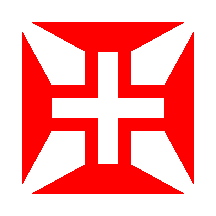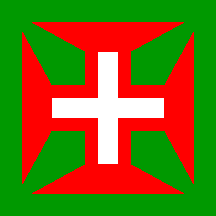
Last modified: 2014-06-29 by klaus-michael schneider
Keywords: christ knights’ order | ordem dos cavaleiros de cristo | templar | cross: patté (red) | cross: christ knights |
Links: FOTW homepage |
search |
disclaimer and copyright |
write us |
mirrors

The cross of the Order of the Knights of Christ (Ordem dos Cavaleiros
de Cristo, yet another medieaval warrior-monk order) is always red with
white core. It was used in the Discovery sail ships, both as flag and painted
on the sails, and has been used as an ubiquous symbol of Portugal ever since.
(In fact, it would have give a great national emblem,
even in a flag, — simple, striking, distinct — but somehow it never resulted
that way…)
António Martins, 14 Jan 1997
Real flags of the order had this cross over a number of
backgrounds, being most frequent white, green,
and white/green gyronny — the later
said to be the most “correct”.
António Martins, 19 Feb 1998
This symbol, cross potent-formy gules voided argent has currently
official usage in the flag and arms of the Madeira
Autonomous Region, in the roundel of the
Portuguese Air Force, and in some municipal
and sub-municipal arms and flags.
António Martins, 10 Dec 2001
Both versions happen, latin and greek — more often equal armed versions
(see Madeira, for instance) than unequal armed ones.
Unequal armed versions are to be found in a few portuguese
subnational coats of arms, both as a charge and as a decoration —
in one of them: Castelo Branco —, I think in the
badge of the order and in the flag of S. Paulo,
as far as I know.
Nevertheless, the cross is the same for both versions. Or, if you want to
go further into the variations, the cross is also the same as a pretty thin
cross or as a fat one, and its even the same when drawn hollow (as in
Madeira) or solid.
Jorge Candeias, 06 Feb 2001

The square green flag with Christ Knight’s Order cross, said to
have been used by the re-independentist in the revolution of
1640.
In that date Portugal become regained independence after 60 years of
spanish domination, and the flag, originally a naval pendon, reminded
of a glorious age that had then already passed by.
António Martins, 01 Dec 1999
Historische Fahnen [neu32]
has an image of the Banner des Christordens:
Green over white and slightly longer than wide with a red with white Cross
of Christ, the red-white-red of the cross’ arms in ≅1:1:1, and
the arms 1/6 of the hoist in width (or maybe slightly less), and the ends
of the arms extending no more than to twice their width.
Peter Hans van den Muijzenberg, 18 Apr 2002
Shown in [p9t94], referencing a
painting of Jan Huygen van Linschoten, 1638:
Chist Order cross on green. Also used as “national” flag in
1495-1521 (King Manuel’s reign) along
with an arms-on-white flag. Also known as the Restoration Flag, used
as revolution banner in 1640 (regain of independence from Spain).
António Martins, 22 May 1997
The Portugese Order of Knights of Christ, as I understand, originates
from the Portugese priory of the Templars,
which simply changed its name when the order was suppressed by Pope Clement,
and everyone pretended not to notice that his “new” order just happened to
have all the same members.
Will Linden, 11 May 1997
Historische Fahnen [neu32] tells us something like (my translation):
Peter Hans van den Muijzenberg, 18 Apr 2002Following the dissolution of the Order of the Templars on instigation of the King of France in 1312, King Dionysius of Portugal in 1319 used their possesions to found the Order of Christ, which also took over the order’s symbol.
In 1494 the right to conquer the new world was divided between Portugal and Spain. In America the division placed Brazil in the Portuguese Zone, where the introduction of Christianity was primarily due to the Order of Christ, whose Cross Brazil bore in its arms until 1889.
The Treaty of Tordesillas (7 June 1494) placed the limit 370 leagues
west of Cape Verde islands. According to Encyclopaedia Britannica,
the Tordesillas meridian is ca. 48°30’W.
Ivan Sache, 19 Apr 2002, and
Santiago Dotor, 23 Apr 2002
This Order had a major role in the early seafaring
expeditions, its red on white pointy patent hollow cross being ultimately
the symbol of the portuguese expansion — a symbol that outlived
the Order itself and its very original meaning.
António Martins, 19 Feb 1998
See also:
It was used in the Discovery sail ships, and
has been used as an ubiquous symbol of Portugal ever since.
António Martins, 14 Jan 1997 and 07 Oct 2001
That said it features in relatively few subnational coats of arms,
even if it is quite often.
António Martins, 14 Jan 1997 and 07 Oct 2001
Anything below this line was not added by the editor of this page.